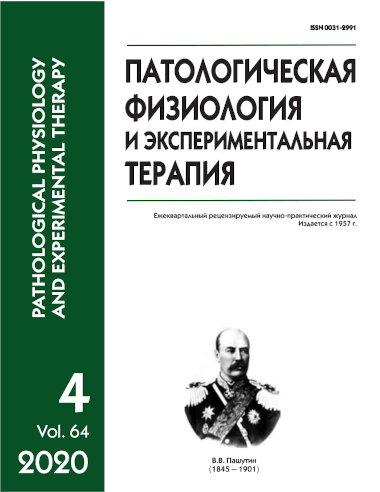Paradoxical refractoriness developing with the allogeneic transfer of splenic lymphocyte total RNA from animals with treated alloxan diabetes to animals with untreated diabetes
Abstract
Introduction. Earlier we have shown that preparations of allogenic total RNA from lymphoid and stem cells of healthy animals contribute to normalization of blood glucose levels in white outbred rats with persistent alloxan-induced diabetes mellitus.
The aim of this study was to find out whether allogenic total RNA isolated from the spleen of rats treated for alloxan diabetes affects its course, as determined by changes in blood glucose, in animals with persistent alloxan diabetes.
Methods. Experiments were performed on 35 white outbred female rats weighing 250-280 g. Rats were divided into intact animals (n=5), rats with experimental alloxan diabetes mellitus (n=20), and rats after persistent alloxan diabetes (n=10) whose blood glucose level had been completely normalized by administrating total RNA of bone marrow, splenic, and pancreatic cells (postdiabetes group). Diabetes mellitus was modeled with a single subcutaneous (s.c.) injection of complete Freund’s adjuvant (0.5 ml) followed by a s.c. injection of alloxan trihydrate (200 mg/kg). Achievement of normoglycemia in animals of the post-diabetes group was confirmed over the next 60 days. Then total RNA was isolated from their spleen and bone marrow by phenol-chloroform extraction, and the effect of a single intraperitoneal injection of total RNA (15 μg/100 g body weight) was studied.
Results. Administration of splenic total RNA from rats previously treated for alloxan diabetes to animals with alloxan diabetes resulted in development of stable and prolonged refractoriness of diabetic rats to the treatment with therapeutic RNA preparations [11].
Conclusions. This study discovered a phenomenon of hypersensitivity of rats with alloxan diabetes to the diabetogenic effect of total RNA from animals that had previously had alloxan diabetes. Apparently, this refractoriness was caused by the clonal component of the total RNA of CD8 + T memory lymphocytes from the spleen of post-diabetes animals. A mechanism is proposed for the interaction between individual components of splenic total RNA from post-diabetes rats and their target lymphocytes in recipients with alloxan diabetes.






